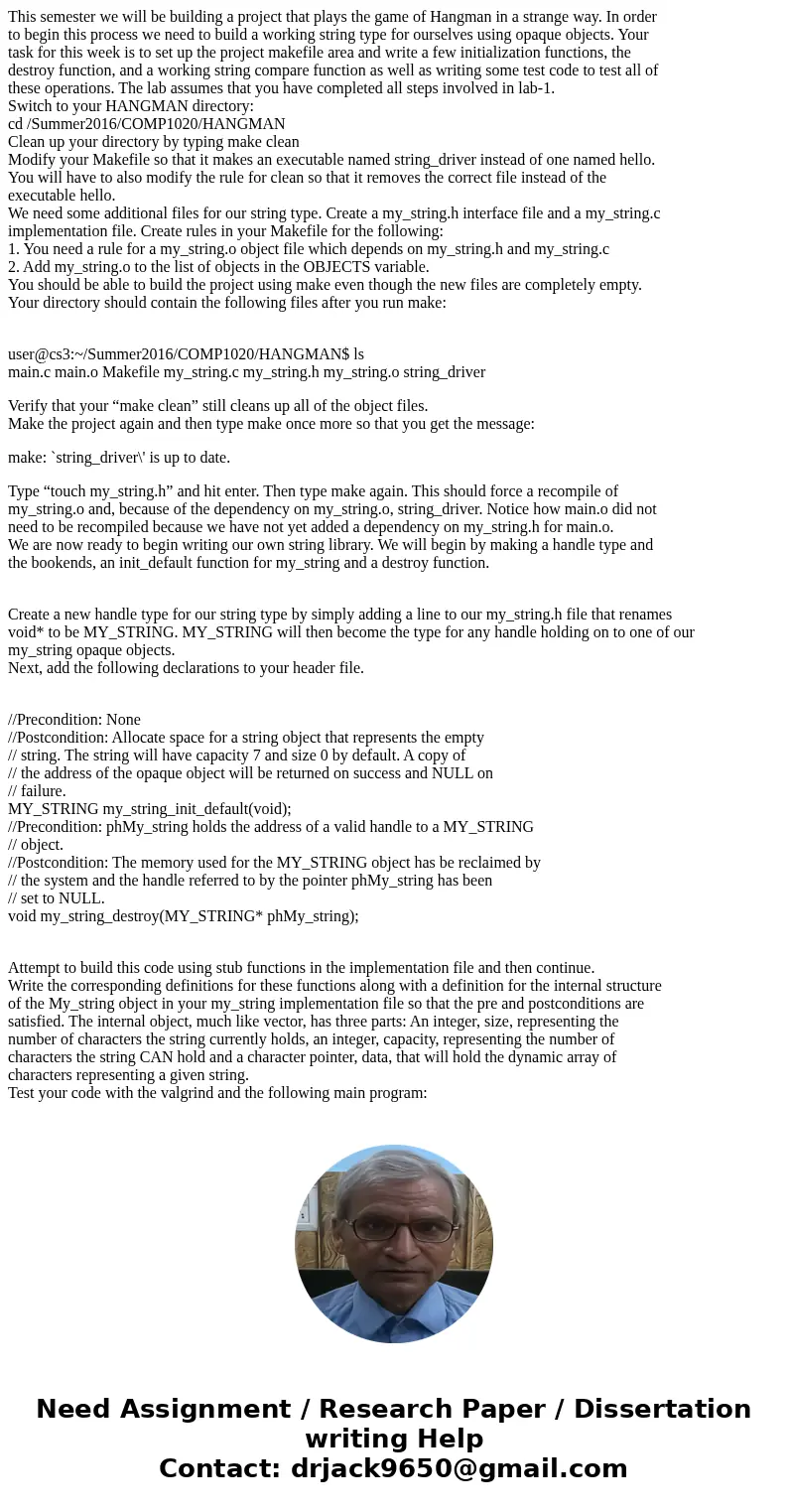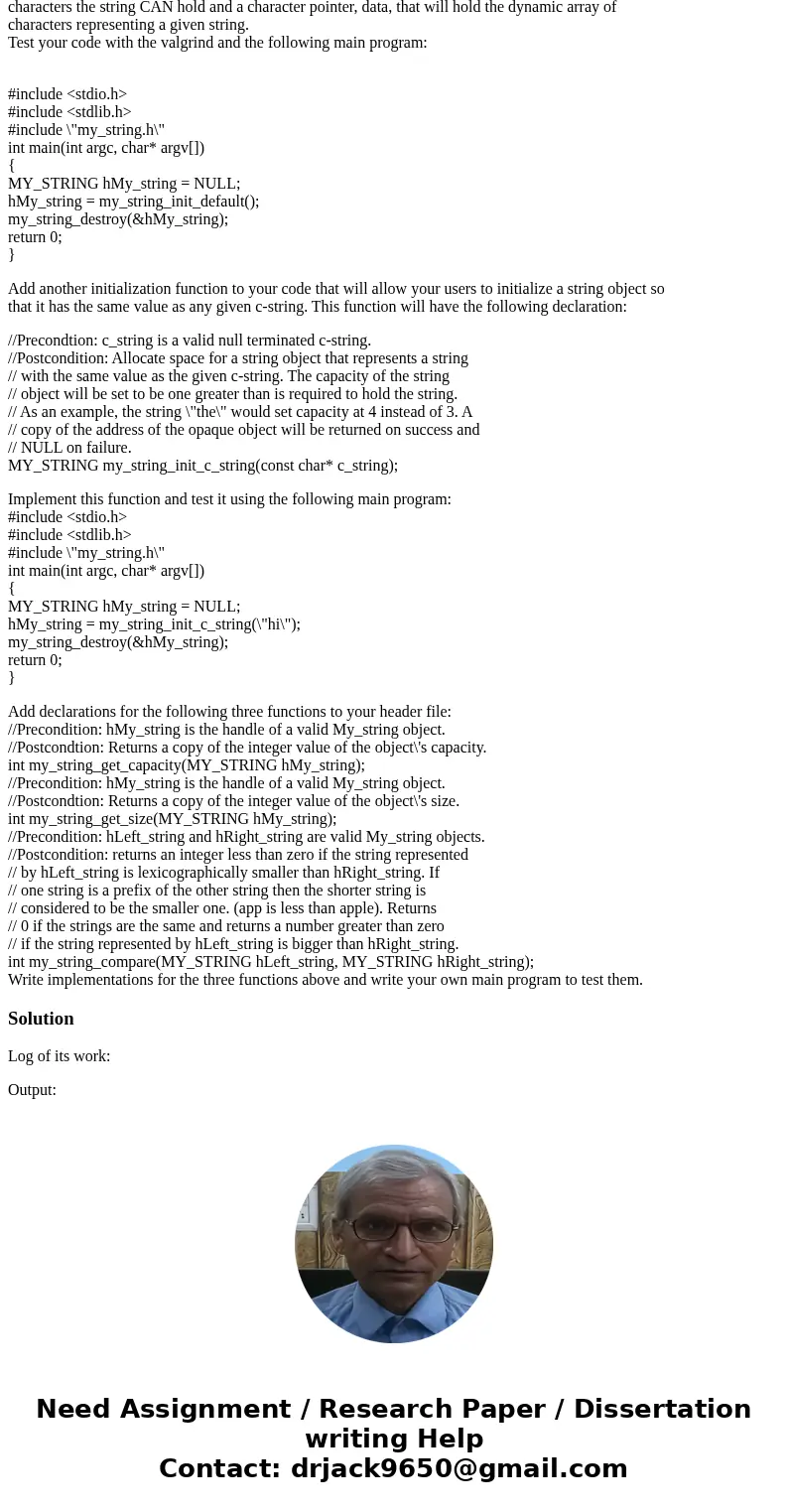This semester we will be building a project that plays the g
This semester we will be building a project that plays the game of Hangman in a strange way. In order
to begin this process we need to build a working string type for ourselves using opaque objects. Your
task for this week is to set up the project makefile area and write a few initialization functions, the
destroy function, and a working string compare function as well as writing some test code to test all of
these operations. The lab assumes that you have completed all steps involved in lab-1.
Switch to your HANGMAN directory:
cd /Summer2016/COMP1020/HANGMAN
Clean up your directory by typing make clean
Modify your Makefile so that it makes an executable named string_driver instead of one named hello.
You will have to also modify the rule for clean so that it removes the correct file instead of the
executable hello.
We need some additional files for our string type. Create a my_string.h interface file and a my_string.c
implementation file. Create rules in your Makefile for the following:
1. You need a rule for a my_string.o object file which depends on my_string.h and my_string.c
2. Add my_string.o to the list of objects in the OBJECTS variable.
You should be able to build the project using make even though the new files are completely empty.
Your directory should contain the following files after you run make:
user@cs3:~/Summer2016/COMP1020/HANGMAN$ ls
main.c main.o Makefile my_string.c my_string.h my_string.o string_driver
Verify that your “make clean” still cleans up all of the object files.
Make the project again and then type make once more so that you get the message:
make: `string_driver\' is up to date.
Type “touch my_string.h” and hit enter. Then type make again. This should force a recompile of
my_string.o and, because of the dependency on my_string.o, string_driver. Notice how main.o did not
need to be recompiled because we have not yet added a dependency on my_string.h for main.o.
We are now ready to begin writing our own string library. We will begin by making a handle type and
the bookends, an init_default function for my_string and a destroy function.
Create a new handle type for our string type by simply adding a line to our my_string.h file that renames
void* to be MY_STRING. MY_STRING will then become the type for any handle holding on to one of our
my_string opaque objects.
Next, add the following declarations to your header file.
//Precondition: None
//Postcondition: Allocate space for a string object that represents the empty
// string. The string will have capacity 7 and size 0 by default. A copy of
// the address of the opaque object will be returned on success and NULL on
// failure.
MY_STRING my_string_init_default(void);
//Precondition: phMy_string holds the address of a valid handle to a MY_STRING
// object.
//Postcondition: The memory used for the MY_STRING object has be reclaimed by
// the system and the handle referred to by the pointer phMy_string has been
// set to NULL.
void my_string_destroy(MY_STRING* phMy_string);
Attempt to build this code using stub functions in the implementation file and then continue.
Write the corresponding definitions for these functions along with a definition for the internal structure
of the My_string object in your my_string implementation file so that the pre and postconditions are
satisfied. The internal object, much like vector, has three parts: An integer, size, representing the
number of characters the string currently holds, an integer, capacity, representing the number of
characters the string CAN hold and a character pointer, data, that will hold the dynamic array of
characters representing a given string.
Test your code with the valgrind and the following main program:
#include <stdio.h>
#include <stdlib.h>
#include \"my_string.h\"
int main(int argc, char* argv[])
{
MY_STRING hMy_string = NULL;
hMy_string = my_string_init_default();
my_string_destroy(&hMy_string);
return 0;
}
Add another initialization function to your code that will allow your users to initialize a string object so
that it has the same value as any given c-string. This function will have the following declaration:
//Precondtion: c_string is a valid null terminated c-string.
//Postcondition: Allocate space for a string object that represents a string
// with the same value as the given c-string. The capacity of the string
// object will be set to be one greater than is required to hold the string.
// As an example, the string \"the\" would set capacity at 4 instead of 3. A
// copy of the address of the opaque object will be returned on success and
// NULL on failure.
MY_STRING my_string_init_c_string(const char* c_string);
Implement this function and test it using the following main program:
#include <stdio.h>
#include <stdlib.h>
#include \"my_string.h\"
int main(int argc, char* argv[])
{
MY_STRING hMy_string = NULL;
hMy_string = my_string_init_c_string(\"hi\");
my_string_destroy(&hMy_string);
return 0;
}
Add declarations for the following three functions to your header file:
//Precondition: hMy_string is the handle of a valid My_string object.
//Postcondtion: Returns a copy of the integer value of the object\'s capacity.
int my_string_get_capacity(MY_STRING hMy_string);
//Precondition: hMy_string is the handle of a valid My_string object.
//Postcondtion: Returns a copy of the integer value of the object\'s size.
int my_string_get_size(MY_STRING hMy_string);
//Precondition: hLeft_string and hRight_string are valid My_string objects.
//Postcondition: returns an integer less than zero if the string represented
// by hLeft_string is lexicographically smaller than hRight_string. If
// one string is a prefix of the other string then the shorter string is
// considered to be the smaller one. (app is less than apple). Returns
// 0 if the strings are the same and returns a number greater than zero
// if the string represented by hLeft_string is bigger than hRight_string.
int my_string_compare(MY_STRING hLeft_string, MY_STRING hRight_string);
Write implementations for the three functions above and write your own main program to test them.
Solution
Log of its work:
Output:


 Homework Sourse
Homework Sourse